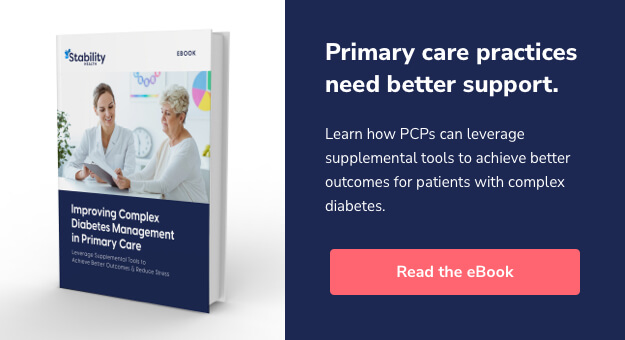
Our National Endocrinologist Shortage: Understanding the Issue
The Current Situation: Context & Causes
What Does This Shortage Mean for Patients?
Solutions to the Endocrinologist Shortage
How Healthcare Systems Can Attract Endocrinologists
The Current Situation: Context & Causes
The CDC classified diabetes as an epidemic in 1994, and disease incidence has continued to rise. Today, 34.2 million Americans are living with diabetes and many more are considered pre-diabetic. Access to diabetes treatment options is often fragmented, exacerbated by the national shortage of endocrinologists: just over 8,000 of these specialists currently practice in the U.S.
Even this number is an overestimate of specialists who treat people with diabetes. Many in the endocrine specialty focus on other diseases (like thyroid or pituitary) or have significantly limited clinical practices, spending most of their time on research, education, or in commercial ventures. It is reasonable to estimate that there is a ratio of one endocrinologist to every 5,000 people with diabetes; this does not account for the millions of Americans with other endocrine diseases.
The reasons for this national shortage of diabetes specialists are manifold:
- Endocrinologists receive the lowest compensation of all internal medicine (IM) specialties — lower even than practicing general internists — and 76–89% of medical students graduate with astronomical debt.
- Additionally, these clinicians often make themselves available outside of their office hours. But since this time may not be billable, it is often not supported in salaried compensation.
- Separately (but related), in 2016, 71% of entrants to the field of endocrinology were female. Due to America’s long-standing gender wage gap, this may be a contributing factor in wage stagnation.
- The rewards of providing diabetes care are not immediately apparent. Among medical professionals, diabetes maintains a reputation of requiring intensive, under-stimulating, long-term care with inconsistent results.
- The study and treatment of diabetes is data-heavy, but also requires that clinicians get to know the whole person to build and maintain long-term relationships with sometimes challenging patients.
- Today’s medical students may lack enthusiastic mentors in endocrinology who can encourage them to enter the specialty.
- The American healthcare finance system is focused on crisis management. This means that managing chronic diseases like diabetes — in order to prevent its attendant long-term complications — is not a top priority.
- One-year training courses in diabetes or obesity medicine have become more prevalent, although they are not approved by the Accreditation Council for Graduate Medical Education.
- Those who have completed one-year programs compete with certified endocrinologists for openings in community practice settings, and while they have gained a similar level of expertise, they are at a disadvantage given the lack of professional recognition (board-certification).
Compounded, all these factors lead many clinicians to choose other specialties or suffer early burnout. In 2014, Robert A. Vigersky, et al estimated that the field of endocrinology needed to sustain a growth rate of 5.5% over a 10-year period to close the gap between supply and demand; but with an 8% retirement rate and a stagnant growth rate in 2020, the challenge to the field is significant.
The Value of Endocrinologists
Roughly 85% of Americans with diabetes rely on a general practitioner for their care. This can be sufficient for more manageable diabetes, particularly for patients with type 2. However, primary care physicians receive little training in complex diabetes care, which is necessary for treating challenging patients or patients who require more professional assistance with disease management. These clinicians are not always familiar with the latest diabetes technologies and treatments available — and diabetes treatment options have increased in scale and complexity.
Endocrinologists can help close the gaps in treating diabetes and its related complications. Cost-effective, efficient endocrinologist care is associated with:
- More accurate diagnoses and prescribing practices
- Connection to the latest diabetes research and technology
- Lower patient morbidity rates
- Fewer hospital admissions or readmissions due to diabetes
- Lower overall costs for both healthcare systems and their patients
Patients who have access to an endocrinologist often experience:
- Better long-term health outcomes
- Better education about their disease and its management
- Fewer health emergencies
- Improved overall quality of life
Endocrinologists’ depth and breadth of expertise in hormonal chronic disease management positions them as a key member of many patients’ care teams, especially for patients with complex diabetes and comorbidities.
What Does This Shortage Mean for Patients?
Though the endocrinologist shortage is by no means the only contributing factor to fragmented diabetes care, the quality of diabetes care declines without their expert support.
Many patients with diabetes either travel long distances to meet with a specialist or rely on the care provided by a general practitioner. PCPs face massive pressure to see as many patients per day as possible; but for a nuanced, chronic illness like diabetes, quick, periodic visits to the doctor are often insufficient.
Brief face-to-face interactions with their clinician, lack of access to specialist treatment, and limited comprehension of self-management requirements may cause a patient to forego care altogether. This can lead to “learned helplessness” and critical health consequences — but the problem is not without solutions:
Supplemental, virtual diabetes care platforms try to fill the needs of patients outside the exam room, but many of these services operate without clinician or endocrinologist support or oversight (the Stability Health model of care being an exception). Though they may provide helpful guidance, patient programs that operate outside of the clinical sphere are not an effective solution to care.
Telehealth is a viable option if a patient does not live within easy travel distance of an endocrinologist, or has other reasons (e.g. COVID-19) for avoiding healthcare facilities. However, patients who live in rural areas with poor service or internet connection, or those without the relevant technology, can be left behind.
Lack of patient access to expert care too often results in comorbidities, complications, or emergency medical procedures. These can add financial strain to patients in an already stressful situation.
However, there are practical steps healthcare systems can take to drive improved patient outcomes, provider efficiency, and morale.
Solutions to the Endocrinologist Shortage
A series of the following solutions, deployed in tandem, may be most effective in mitigating the national shortage of diabetes specialists.
Maintain telehealth services
Even before the COVID-19 pandemic necessitated telehealth, virtual care was catching on for routine appointments or patients who don’t require physical examinations or testing. Going forward, the trend is unlikely to decline. Endocrinologists are prime candidates for administering virtual care since they are comfortable reviewing data and utilizing software to track patient progress. This would allow patients in rural or underserved areas to receive expert care, as the minimum requirement is access to a telephone.
Financially incentivize specialists
Much like the Medicare and Medicaid bonuses for clinicians who commit to practicing in Health Professional Shortage Areas (HPSAs), healthcare systems should incentivize endocrinologists to go where they are most needed. Changes are currently being made in reimbursement to fairly compensate endocrinologists for their expertise and high-quality care.
Provide supplemental expert support
Providers should consider implementing new technologies and programs like Stability Health that allow primary care clinicians to access expert diabetes support — not as a replacement for their own care, but to provide assistance with medication recommendations, data review, remote patient support, and treatment plan development. Having access to clinical expertise and virtual, scalable diabetes support tools would allow clinicians to see more patients, help their patients meet goals, and lower physician burnout.
Establish mentorship programs
A dedicated mentor can help endocrinology students make inroads to professional success. Mentorship is often a key factor in identifying a career path and can help support the goals of students and fellows. Programs like Women in Endocrinology and Future Leaders Advancing Research in Endocrinology (FLARE) by the Endocrine Society provide leadership development opportunities and hands-on training skills not always taught in medical schools, like lab management and applying for grants. FLARE prioritizes students and junior faculty from communities typically underrepresented in medicine.
How Healthcare Systems Can Attract Endocrinologists
It is possible to build an infrastructure that supports a shared diabetes care model in the American healthcare system. With comprehensive, supplemental diabetes care solutions like Stability Health gaining traction among clinicians and providers, endocrinologists will become increasingly valued in medicine.
Benefits of a Career in Endocrinology
- Intellectual stimulation
- Develop longitudinal relationships with patients
- Collaborative problem-solving with patients and clinicians
- Exercise compassion, patience, and empathy
- Make a positive impact in solving a global health crisis
How Can Medical Educators Incentivize the Field?
- Shift the training focus from education to service
- Convey enthusiasm for the specialty
- Promote the teaching component of the specialty (both patient- and colleague-facing)
- Establish financial incentives for graduates to commit to the specialty or to practice in a specific geographical area
How Can Healthcare Systems Attract Endocrinologists?
- Establish loan repayment and forgiveness programs
- Implement a model of shared care
- Promote autonomy and flexibility of the specialty
- Educate specialists on available resources
Source: Trends in the Endocrinology Fellowship Recruitment: Reasons for Concern and Possible Interventions by Giulio R. Romeo, et al
Specialist Resources to Know
- Association of Diabetes Care and Education Specialists (ADCES)
- Certified Diabetes Care and Education Specialists (CDCES)
- Health and nutrition behavioral specialists
- RNs & NPs
- PAs & MAs
- Digital diabetes support tools
- Clinician-led supplemental care services like Stability Health
Incentives to enter and remain in the field of endocrinology should be present early in a medical student’s journey and throughout their career. Perhaps most important, medical training programs need to highlight the significant returns for clinicians specializing in endocrinology: a positive patient experience and improved quality of life once they reach their goals.



